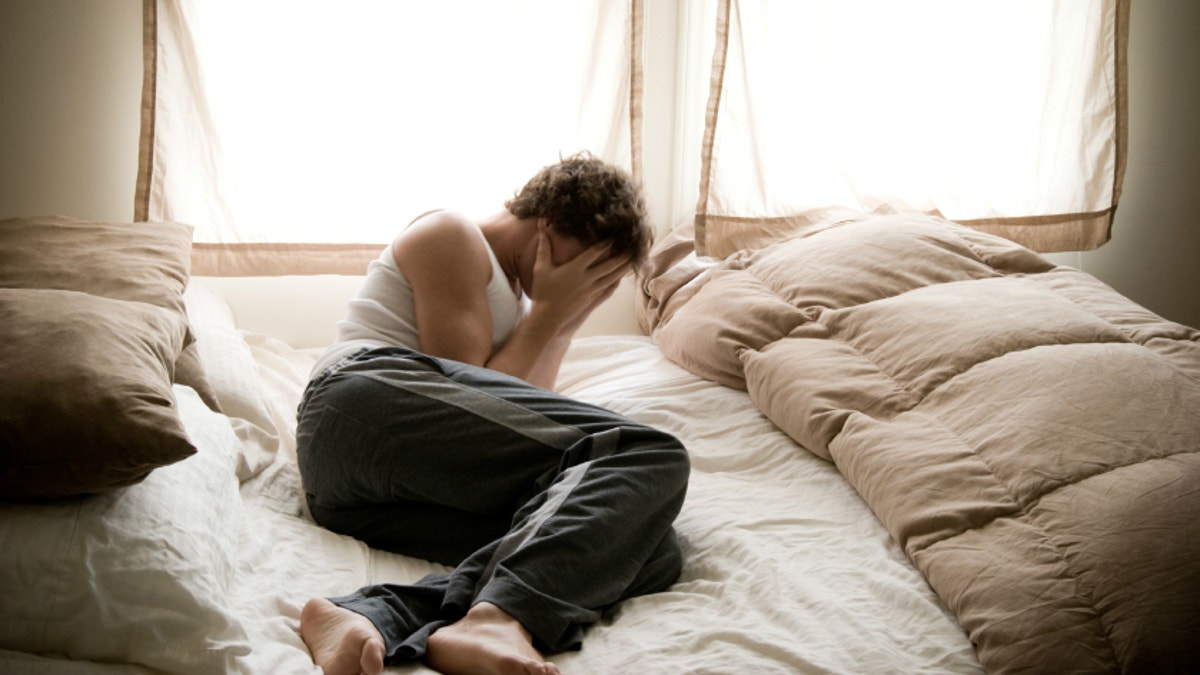
“Is there any chance I can get out of this without anyone knowing?”
That’s the first thought Sam*, a 27-year-old from Massachusetts, has after an evening of drinking.
He’s not regretting an awkward hookup or an especially embarrassing bout of karaoke.
Instead, he’s dreading a reality that sometimes plagues him after a beer-soaked night: a pee-soaked bed the next morning.
And that, of course, is troubling enough if you’re sleeping solo, but it’s super embarrassing if you’re not the only one under the sheets.
Related: The Better Man Project From Men’s Health—2,000+ Awesome Tips on How to Live Your Healthiest Life
You probably think of bedwetting—or nocturnal enuresis, as it’s medically known—as a kids’ problem, says Raj Dasgupta, M.D., an assistant professor of clinical medicine at the University of Southern California’s Keck School of Medicine.
But it can be a grown man’s issue, too: Anywhere from 0.5 to 2 percent of adults involuntarily pee in their sleep, according to a 2013 review in the journal BMJ.
And that number is likely on the low side.
“Since it’s embarrassing, it tends to be an underreported issue,” says Dr. Dasgupta.
That means it’s likely that more men experience it. But what’s causing an otherwise healthy guy to wet the bed after boozing?
Related: What It Means If You Pee Blood
Why You Wet the Bed After Drinking
The main piece of the puzzle has to do with something called the antidiuretic hormone (ADH), says James Ulchaker, M.D., a urologist at the Cleveland Clinic.
When you’re sober, ADH’s job is to prevent the production of urine—it tells your kidneys to conserve water, so you are not peeing out all of your body’s stash.
But when you drink alcohol, the booze actually suppresses the release of ADH.
Related: Why You Bruise More Easily When You Drink Alcohol
“The kidneys don’t reabsorb water, so when you drink, you’re going to make larger amounts of urine,” says Dr. Ulchaker.
This effect doesn't exactly quit when you put down the bottle and hit the pillow, either:
“Depending on how much and how late you drink, this suppression of ADH can carry into the night—even when you're sleeping,” says Dr. Dasgupta.
That means while you’re asleep, your body is producing a whole lot more urine than it normally does when you’re sober.
If you’re awake, you likely notice this urge and go the bathroom. But if you’re dead asleep—even if it’s been a couple hours since you’ve been drinking—you might miss it.
Alcohol also irritates a certain muscle in your bladder. This makes it contract, which is what happens when you urinate, says Men’s Healthsleep advisor W. Christopher Winter, M.D.
The contraction is what allows you to pee—and it’s also what lets you know you have to go. Again, if you’re asleep (and drunk), you may miss the signal.
Basically, you end up ignoring your body’s signals because you’re too drunk to acknowledge them properly.
You might also blame your brain.
When you’re drunk, your inhibitions are lowered. So there could possibly come a point where your subconscious says, ‘Forget it, I'm not going to the bathroom,’ says Dr. Dasgupta. (Kind of like when you make other stupid decisions when you’re awake and intoxicated.)
What’s more, one too many cold ones can make your dreams more vivid, says Dr. Winter.
As a result, you may feel like your dreams are your reality.
Case in point: Some of Dr. Winter’s patients have woken up in a puddle of pee, convinced that they had taken care of the situation appropriately—in their dreams, they were peeing in the bathroom, not their beds.
Should You Worry About Wetting the Bed After Drinking?
While wetting the bed as a grown man can certainly be awkward, doing so occasionally after a crazy night out isn’t anything to worry about.
For instance, in Sam’s case, he knows what leads to a leak: It happens when he drinks more beer than usual, and only once in a blue moon.
Related: 7 Healthy Reasons You Should Drink Beer
But if it’s happening almost every time you drink—or outside of drinking? See a urologist.
Doctors worry about things like an overactive bladder, overflow incontinence, infections, or other urological issues, Dr. Ulchaker says. So your doctor may perform a full urological work-up.
How to Stop Wetting the Bed After Drinking
The pure volume of liquid you’re drinking may contribute to whether or not you wake up to a wet bad, says Dr. Ulchaker.
That’s why beer—like in Sam’s case—might be more likely to leave you in a puddle than liquor, he says. (With every drink, you’re taking in 10.5 more ounces than a shot.)
The solution isn’t switching to pure whiskey, but rather considering the overall amount you’re taking in.
How much is too much depends on each guy, but if you’ve wet the bed after drinking a certain amount before, you might want to experiment with reducing it to see if you can sleep pee-free.
It’s time to cut the Red Bull and vodkas, too.
“You’re going to pee more drinking alcohol and caffeine,” says Dr. Ulchaker.
Related: Why You Shouldn’t Drink Coffee When You’re Drunk
Caffeine also irritates your bladder’s muscle, and doesn’t allow it to hold as much urine. Which means you’ll have to empty it sooner.
Pee right before bed, and then set an alarm for the middle of the night—say, 4 a.m. if you hit the sheets around midnight.
It’s not ideal, but a middle-of-the-night wake-up call will force you to get up and empty your bladder, cutting the chances of a wet bed, says Dr. Dasgupta.
*Name has been changed.








































